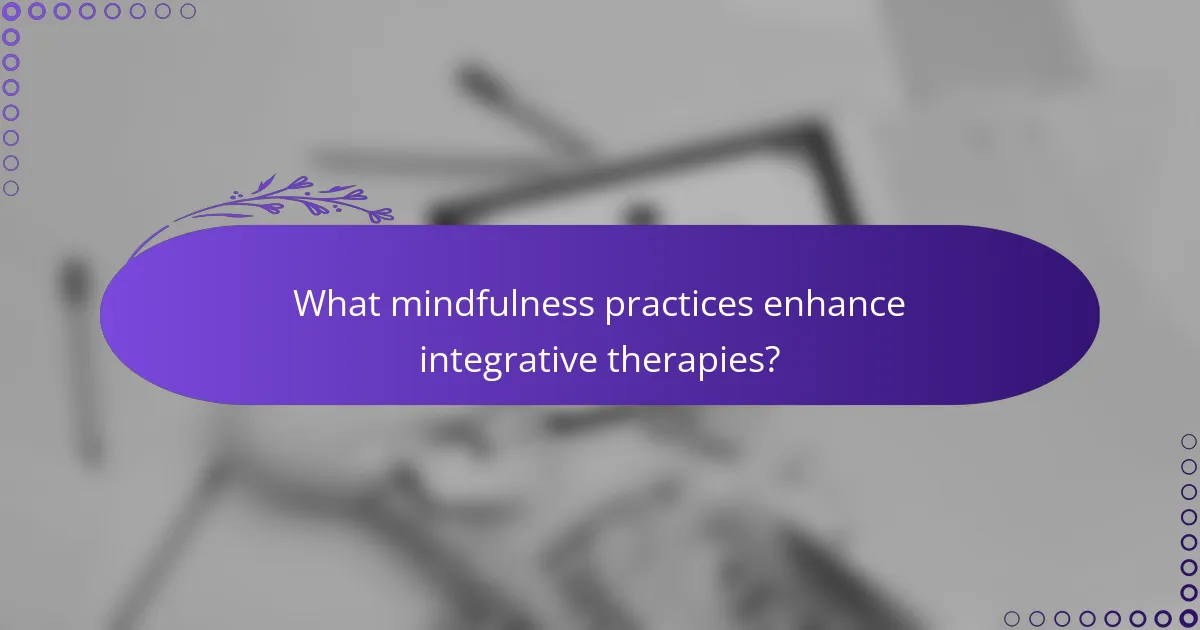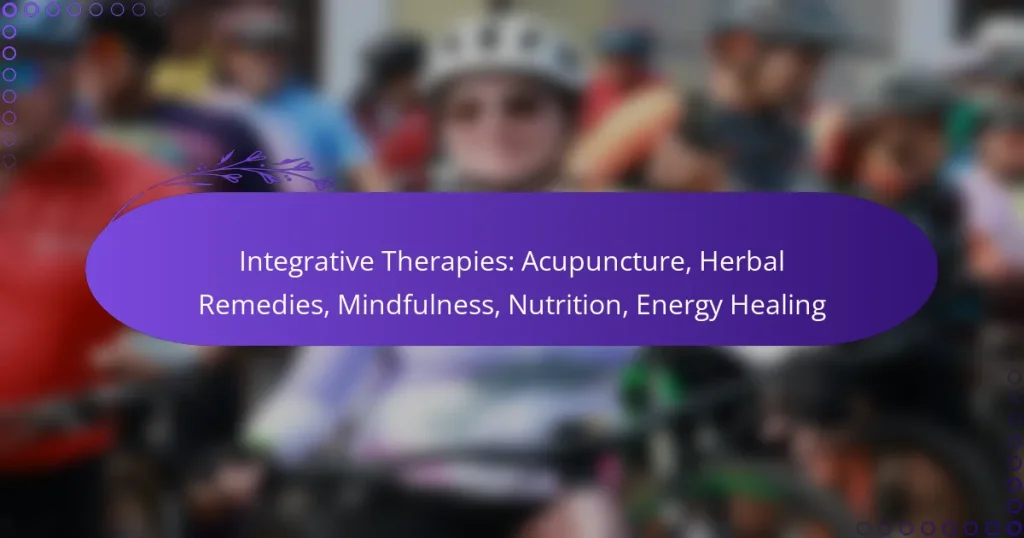Integrative therapies encompass a holistic approach to health, combining practices like acupuncture, herbal remedies, mindfulness, nutrition, and energy healing to promote overall well-being. By addressing both physical and mental aspects of health, these therapies aim to create balance and enhance the body’s natural healing processes. Each modality offers unique benefits, making them valuable components of a comprehensive wellness strategy.

What are the benefits of acupuncture in integrative therapies?
Acupuncture offers various benefits as part of integrative therapies, primarily focusing on pain management, stress relief, and overall wellness. This ancient practice stimulates specific points on the body to promote healing and balance, making it a valuable tool in holistic health approaches.
Pain relief
Acupuncture is widely recognized for its effectiveness in alleviating various types of pain, including chronic back pain, arthritis, and migraines. By targeting specific acupuncture points, it can help release endorphins and improve blood circulation, which may reduce inflammation and promote healing.
Individuals often experience significant pain relief after just a few sessions, with many reporting a decrease in pain levels by 30-50% within a few weeks. It is advisable to consult a licensed acupuncturist to tailor the treatment plan to individual needs.
Stress reduction
Acupuncture can significantly lower stress levels by promoting relaxation and enhancing emotional well-being. The treatment activates the parasympathetic nervous system, which helps reduce cortisol levels and encourages a state of calm.
Regular acupuncture sessions can lead to improved mood and reduced anxiety symptoms. Many practitioners recommend weekly sessions for optimal results, especially during stressful periods.
Improved sleep quality
Many people find that acupuncture helps improve sleep quality by addressing underlying issues such as stress and pain. It can help regulate sleep patterns and enhance overall restfulness, making it easier to fall asleep and stay asleep.
Studies suggest that individuals receiving acupuncture for sleep disturbances may experience a notable improvement in sleep duration and quality after several treatments. Incorporating acupuncture into a nighttime routine can be a beneficial strategy for those struggling with insomnia.
Enhanced overall wellness
Acupuncture contributes to enhanced overall wellness by promoting balance within the body and supporting various bodily functions. It can strengthen the immune system, improve digestion, and increase energy levels.
Incorporating acupuncture into a holistic health regimen can lead to long-term benefits, including better physical health and emotional resilience. It is essential to maintain open communication with healthcare providers to integrate acupuncture effectively with other treatments.

How do herbal remedies support integrative therapies?
Herbal remedies play a significant role in integrative therapies by enhancing overall wellness and addressing specific health concerns. They can complement other treatment modalities, such as acupuncture and mindfulness, by providing natural solutions that align with holistic health principles.
Natural healing properties
Herbal remedies are known for their natural healing properties, which can aid in various health conditions. For instance, herbs like echinacea and elderberry are often used to support respiratory health and boost recovery from colds. These plants contain bioactive compounds that interact with the body’s systems, promoting healing without the side effects commonly associated with pharmaceuticals.
When selecting herbal remedies, consider their traditional uses and any scientific research backing their efficacy. Consulting with a healthcare professional knowledgeable in herbal medicine can help ensure safe and effective use.
Boosting immune function
Many herbal remedies are recognized for their ability to boost immune function. Herbs such as astragalus and garlic have been shown to enhance immune response, helping the body fend off infections. Regular consumption of these herbs can lead to improved resilience against illnesses.
Incorporating immune-boosting herbs into your diet can be as simple as adding garlic to meals or taking astragalus supplements. However, it’s essential to consult with a healthcare provider before starting any new herbal regimen, especially if you have underlying health conditions or are taking medications.
Reducing inflammation
Herbal remedies can effectively reduce inflammation, a common underlying factor in many chronic diseases. Turmeric, for example, contains curcumin, a compound known for its anti-inflammatory properties. Regular use of turmeric in cooking or as a supplement can help manage inflammation levels in the body.
Other herbs, such as ginger and boswellia, also offer anti-inflammatory benefits. To maximize their effects, consider incorporating these herbs into your daily routine, but always discuss with a healthcare professional to ensure they fit your specific health needs and conditions.

What mindfulness practices enhance integrative therapies?
Mindfulness practices such as meditation, breathing exercises, and mindful eating can significantly enhance the effectiveness of integrative therapies. These techniques promote relaxation, improve focus, and foster a deeper connection between the mind and body, which can lead to better health outcomes.
Meditation techniques
Meditation techniques can vary widely, but they generally involve focusing the mind to achieve a state of calm and clarity. Common methods include guided meditation, where a facilitator leads the session, and mindfulness meditation, which emphasizes being present in the moment. Practicing for just 10-20 minutes daily can help reduce stress and improve emotional well-being.
To get started, find a quiet space, sit comfortably, and focus on your breath or a specific mantra. Avoid distractions and gently bring your mind back when it wanders. Regular practice can enhance your overall experience with other integrative therapies.
Breathing exercises
Breathing exercises are simple yet powerful techniques that can help regulate the body’s stress response. Techniques such as diaphragmatic breathing or the 4-7-8 method can promote relaxation and enhance focus. Aim to practice these exercises for a few minutes several times a day, especially when feeling stressed or anxious.
For example, in the 4-7-8 method, inhale through your nose for 4 seconds, hold your breath for 7 seconds, and exhale through your mouth for 8 seconds. This practice can help calm the nervous system and prepare you for more effective engagement with integrative therapies.
Mindful eating
Mindful eating involves paying full attention to the experience of eating, which can improve digestion and promote healthier food choices. This practice encourages individuals to savor each bite, recognize hunger cues, and appreciate the flavors and textures of food. Setting aside distractions during meals can enhance this experience.
To practice mindful eating, try to eat slowly and without multitasking. Focus on the taste, smell, and texture of your food, and listen to your body’s signals about hunger and fullness. This approach not only enriches your meals but also supports overall well-being and complements other integrative therapies.

How does nutrition play a role in integrative therapies?
Nutrition is a fundamental component of integrative therapies, influencing overall health and wellness. A well-balanced diet can enhance the effectiveness of other therapeutic approaches, such as acupuncture and herbal remedies, by providing essential nutrients that support bodily functions and healing processes.
Balanced diet recommendations
A balanced diet should include a variety of foods from all food groups: fruits, vegetables, whole grains, lean proteins, and healthy fats. Aim for a colorful plate, as different colors often represent different nutrients. For adults, a general guideline is to fill half your plate with fruits and vegetables, one-quarter with whole grains, and one-quarter with protein sources.
Consider portion sizes and try to limit processed foods high in sugars and unhealthy fats. Incorporating local seasonal produce can also enhance the nutritional value of your meals while supporting local agriculture.
Role of superfoods
Superfoods are nutrient-rich foods that can provide health benefits beyond basic nutrition. Examples include blueberries, quinoa, kale, and salmon, all known for their high levels of antioxidants, vitamins, and omega-3 fatty acids. Including these foods in your diet can help boost your immune system and reduce inflammation.
While superfoods can be beneficial, they should complement a balanced diet rather than replace other essential foods. Focus on variety to ensure you receive a broad spectrum of nutrients.
Nutrition for mental health
Nutrition plays a critical role in mental health, with certain foods linked to improved mood and cognitive function. Omega-3 fatty acids, found in fish and flaxseeds, are known to support brain health, while complex carbohydrates from whole grains can help stabilize blood sugar levels and mood.
Consider incorporating foods rich in B vitamins, such as leafy greens and legumes, as they are essential for energy production and brain function. Avoid excessive sugar and caffeine, which can lead to mood swings and anxiety.

What is energy healing and its significance?
Energy healing is a holistic practice that aims to balance and restore the body’s energy systems, promoting physical, emotional, and spiritual well-being. It is significant because it addresses underlying issues that may contribute to illness, offering a complementary approach to traditional medical treatments.
Chakra balancing
Chakra balancing involves aligning the body’s seven energy centers, or chakras, to enhance overall health. Each chakra corresponds to different physical and emotional aspects, and imbalances can lead to various issues. Techniques such as meditation, visualization, and specific yoga poses are commonly used to restore balance.
To practice chakra balancing, individuals can focus on one chakra at a time, using affirmations or crystals associated with that energy center. Regular practice can lead to improved emotional stability and physical health.
Reiki therapy
Reiki therapy is a form of energy healing that originated in Japan, where practitioners use their hands to channel energy into the recipient, promoting relaxation and healing. This technique is non-invasive and can be performed in person or remotely, making it accessible to many.
During a Reiki session, clients typically lie down fully clothed while the practitioner lightly places their hands on or near the body. Sessions usually last between 30 to 90 minutes, and many report feeling a sense of deep relaxation and emotional release afterward.
Biofield therapy
Biofield therapy encompasses various techniques that aim to manipulate the energy field surrounding the body, often referred to as the biofield. This approach includes practices like Therapeutic Touch and Healing Touch, which focus on the interaction between the practitioner’s energy and the client’s biofield.
Practitioners assess the biofield for imbalances and use gentle touch or near-body techniques to restore harmony. Sessions can vary in length, typically lasting from 30 to 60 minutes, and may help alleviate stress, pain, and anxiety.

How to choose the right integrative therapy for your needs?
Choosing the right integrative therapy involves understanding your personal health goals, preferences, and any specific conditions you wish to address. It’s essential to consider various options like acupuncture, herbal remedies, mindfulness, nutrition, and energy healing to find the best fit for your unique situation.
Assessing personal health goals
Start by identifying your primary health objectives. Are you looking to manage stress, alleviate chronic pain, or improve overall wellness? Clarifying your goals will help narrow down which therapies may be most beneficial.
Consider the specific symptoms or conditions you want to address. For instance, acupuncture is often effective for pain relief, while mindfulness practices can enhance mental clarity and reduce anxiety. Make a list of your priorities to guide your decision-making.
Consulting with healthcare professionals
Before committing to any integrative therapy, consult with healthcare professionals who understand your medical history and current health status. They can provide valuable insights into which therapies may complement your existing treatment plans.
It’s advisable to seek practitioners who are certified and experienced in their respective fields. For example, if considering herbal remedies, ensure the practitioner is knowledgeable about potential interactions with any medications you are currently taking. This step can help avoid any adverse effects and enhance the effectiveness of your chosen therapy.


